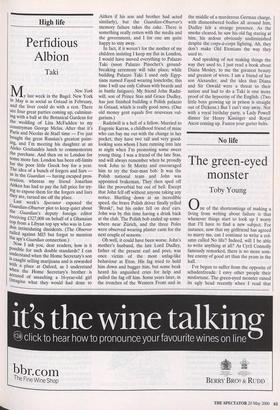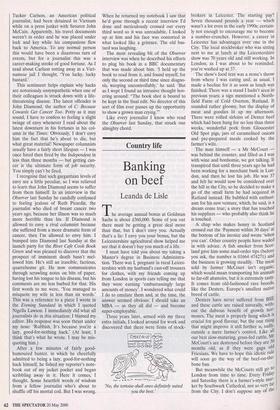No life
The green-eyed monster
Toby Young
One of the shortcomings of making a living from writing about failure is that whenever things start to look up I worry that I'll have to find a new subject. For instance, now that my girlfriend has agreed to marry me, can I continue to write a col- umn called No life? Indeed, will I be able to write anything at all? As Cyril Connolly famously remarked, there is no more som- bre enemy of good art than the pram in the hall.
I've begun to suffer from the opposite of schadenfreude: I envy other people their misfortune. The green-eyed monster raised its ugly head recently when I read that Tucker Carlson, an American political journalist, had been detained in Vietnam while on a press junket with Senator John McCain. Apparently, his travel documents weren't in order and he was placed under lock and key while his companions flew back to America. To any normal person this would have been a disastrous turn of events, but for a journalist this was a career-making stroke of good fortune. As I read about Carlson rotting away in a Viet- namese jail I thought, 'You lucky, lucky bastard.'
This sentiment helps explain why hacks are notoriously unsympathetic when one of their colleagues is struck down with a life- threatening disease. The latest offender is John Diamond, the author of C: Because Cowards Get Cancer Too. Potty as it may sound, I have to confess to feeling a slight twinge of envy whenever I read about the latest downturn in his fortunes in his col- umn in the Times. Obviously, I don't envy him the fact that he's about to die, but what great material! Newspaper columnists usually have a fairly short lifespan — I was once hired then fired by the Independent in less than three months — but getting can- cer is the ultimate form of job security. You simply can't be fired.
I recognise that such gargantuan levels of envy are a little peculiar, so I was relieved to learn that John Diamond seems to suffer from them himself. In an interview in the Observer last Sunday he candidly confessed to feeling jealous of Ruth Picardie, the journalist who died of breast cancer two years ago, because her illness was so much more horrible than his. If Diamond is allowed to envy a rival columnist because she suffered from a more dramatic form of cancer, then I'm allowed to envy him. I bumped into Diamond last Sunday at the launch party for the River Cafe Cook Book Green and was pleased to discover that the prospect of imminent death hasn't mel- lowed him. He's still an irascible, factious, quarrelsome git. He now communicates through scrawling notes on bits of paper, having lost his tongue to his disease, but his comments are no less barbed for that. His first words to me were, 'You managed to misquote my wife in less than six words.' This was a reference to a piece I wrote in the Evening Standard in which I quoted Nigella Lawson. I immediately did what all journalists do in this situation: I blamed my editor. His response was soon thrust under my nose: 'Rubbish. It's because you're a lazy, good-for-nothing hack.' (At least, I think that's what he wrote. I may be mis- quoting him.) After a few minutes of fairly good- humoured banter, in which he cheerfully admitted to being a lazy, good-for-nothing hack himself, he fished my reporter's note- book out of my jacket pocket and began scribbling away in it. Here it comes, I thought. Some heartfelt words of wisdom from a fellow journalist who's about to shuffle off his mortal coil. But I was wrong. When he returned my notebook I saw that he'd gone through a recent interview I'd done and meticulously crossed out every third word so it was unreadable. I looked up at him and his face was contorted in what looked like a grimace. The old bas- tard was laughing.
The most revealing bit of the Observer interview was when he described his efforts to plug his book in a BBC documentary that was made about him. 'I held up the book to read from it, and found myself, for only the second or third time since diagno- sis, weeping uncontrollably,' he said. 'But as I wept I found an intrusive thought hov- ering around: "The book shot is bound to be kept in the final edit. No director of this sort of film ever passes up the opportunity to show a grown man crying."' Like every journalist I know who read the Observer last Sunday, that struck one almighty chord.










































































 Previous page
Previous page